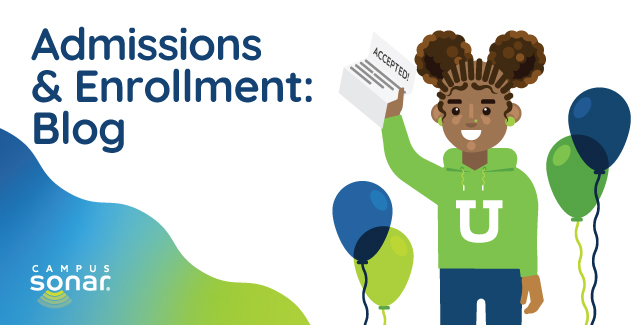Admissions during this "unprecedented time."
by Amanda Jeppson, Social Media Data Analyst

Who didn’t spend 2020 wondering what the heck was going on? COVID-19 was top of mind for everyone. College students included, especially with the disruption of college applications, campus tours, and the “traditional” college experience. That said, let’s dig deeper into the data from our Social Listening for Admissions Insights: February 2021 report to explore and compare COVID-19 conversations to non-COVID-19 conversations that surfaced on social media (Twitter, Instagram, YouTube) and forums (Reddit and College Confidential) among 4-year college prospective and admitted students between August 1, 2020 and October 31, 2020.
Students may not have talked about COVID-19 online as much as you think, but the conversations uncovered can clue you into how incoming students feel and what they need during times that challenge emotions, finances, expectations, and simply the ability to change locations.
While pandemic-related conversations emerged in a smaller subset of prospective and admitted student mentions (3% of total admissions conversations), we realize these conversations probably occurred to a greater extent offline.
Online, prospective students conversed more about COVID-19 in admissions conversations (8%) than admitted students (.4%), and these conversations decreased in the same pattern from August through October. This may be due to habituation to a new way of life or alignment with the academic calendar; at this point, students were thinking about college and the “normalcy” of pandemic life was in full swing. While conversations may not always happen online, campuses should continue to address issues and concerns students may have about the pandemic.
Students’ attitudes towards college were somewhat dampened by the pandemic. They were more negative when discussing it.
- 34% of prospective student conversation was more negative when discussing COVID-19.
- 43% of admitted student conversation was more negative when discussing COVID-19.
And more positive when not talking about it.
- 45% of prospective student conversation was more positive when not talking about COVID-19.
- 63% of admitted student conversation was more positive when not talking about COVID-19.
Collectively, while the majority of admissions conversations were non-COVID-19 related and more positive than negative, the smaller proportion of admissions conversation about COVID-19 was decidedly more negative. Although the pandemic is negative at its very core, campuses can support and encourage their students through it.
Although social media sites were more popular for students overall, both prospective and admitted students used forums more to talk about COVID-19.
- 77% of prospective student mentions about COVID-19 were on forums.
- 37% of their non-COVID-19 conversations were on forums.
That’s a 108% increase in activity on forums. For admitted students, the difference is even more stark.
- 49% of their COVID-19 related mentions on forums.
- Less than 1% of non-COVID-19 conversations were on forums.
That’s a staggering 4,800% increase in activity on forums. The impact of COVID-19 required more characters or a deeper discussion than is possible on social media sites. Social mentions about COVID-19 tended to be brief announcements, while discussions flourished on forums.
Takeaway: Continue to leverage social to take the temperature of incoming students, but rely on forums to see what the larger conversation looks like.
Interrupted Plans
The theme of human experience in 2020, including that of students, was interrupted plans. A breakdown of what prospective and admitted students discussed when talking admissions and the pandemic reveals different facets of impeded intentions. Whereas prospective students often discussed the impact of COVID-19 on their applications, admitted students focused on the college experience. The topics co-occurring with COVID-19 aren’t unlike those found in the overall conversation, but the pandemic added a new dimension, especially with the switch to remote learning.
While some prospective students opted not to apply or explored other options like community college or a gap year (remote learning was cited as a reason), many still planned to apply to a 4-year campus. In fact, 39% of Reddit posts and 30% of College Confidential posts from prospective students were “Chance Me” posts, where the poster provides their credentials and background, and asks an online community to estimate admittance chances.
Regardless, students expressed nervousness and fear. More concrete for prospective students, COVID-19 repercussions affected applying to college. A trifecta of testing changes (e.g., test-optional, suspended tests), limits to extracurricular activities, and remote learning changed application content and upended the balance some students hoped to achieve in their applications. Discontinuing testing also resulted in students’ inability to retest.
COVID-19 emerged in “Chance Me” posts where students became involved in different aspects of the pandemic—activities for their applications. Of course, visiting campuses was challenging too, resulting in students relying on online communities to provide them information about campus, campus experiences, or opinions on fit. Prospective students didn’t frequently speak in-depth to the financial aspect, but it did come up. Knowing this, colleges can clearly message expectations around admissions, campus climate, and create engaging in-person or digital opportunities for students to connect with the institution.
At the intersection of admissions excitement/nervousness and COVID-19 disappointment/uncertainty, admitted students articulated the significance of the pandemic on their college plans and anticipated experience.
Direct impacts included admitted students developing alternative plans to college, such as a gap year or deferral (when specific reasons were given, it was remote learning or tied to cost), while others made different college selections based on COVID-19-related challenges.
Admitted students expressed concerns/disappointment over likely changes to the traditional college experience they originally signed up for, including remote learning. More precarious financial situations due to job losses also surfaced. Place-based limitations resulted in additional hurdles for students needing to travel, such as students visiting campus or having someplace other than home to live. Among the gloomier conversations, a handful of positive stories bloomed of posters overcoming COVID-19 or its associated restrictions to succeed.
Takeaway: With this information, continue to creatively engage students, be aware of topics related to financial stability, be attentive to the importance of place, and continue to celebrate the successes of incoming students.
Remote Learning
We can’t ignore the elephant in the room: remote learning disrupted prospective and admitted students’ college plans. Both groups, when talking about online, remote, or Zoom learning beyond stating it as a fact, disliked the approach.
The shift to online learning resulted in students making alternative plans, even after admittance. While some prospective students continued forward despite the shift, others chose to avoid online learning (some did not want to pay in-person tuition for online learning). Students highlighted these feelings on social media, where they could quickly announce their feelings and the impacts of remote learning on their pathway to college.
Besides discussing online learning in college, prospective students talked on forums about online experiences (classes and activities) from high school they would include in their applications. While admitted students also talked about online learning and changed (or questioned changing) their plans, there seemed to be less of a visceral reaction to online learning on social, with more discussions about the limitations of online learning on forums. The struggle campuses turning to online learning face is getting students to apply and keeping them in the pipeline even after admittance.
The college application and decision process can be challenging and stressful even under ideal circumstances. But this year is far more complicated. In this moment, campuses can serve their future students best by:
- Monitoring online conversation with an intent to understand. Listen to the concerns prospective students share on social media and forums, and remember that for every student asking a question, there are many others looking for the same information. Those conversations can uncover the gaps in your communications and outreach.
- Making information and materials easy to find. No one is at their best when experiencing stress. Consider how you can make application, housing, and financial information easy to find and easy to understand. Simplify your user journeys.
- Meeting students where they are emotionally. Materials and messaging with standard campus photos may feel disingenuous when students know that their experiences won’t look the same. And over-the-top cheerfulness may seem misleading when current students are already sharing honest perspectives about their experiences. Be positive, but be honest.
- Building a foundation of trust. Offer transparency into campus decisions, financial information, online course formats, and current limitations for student activities. Share what you know, but also share what you don’t know—along with how and when you might have those answers.
